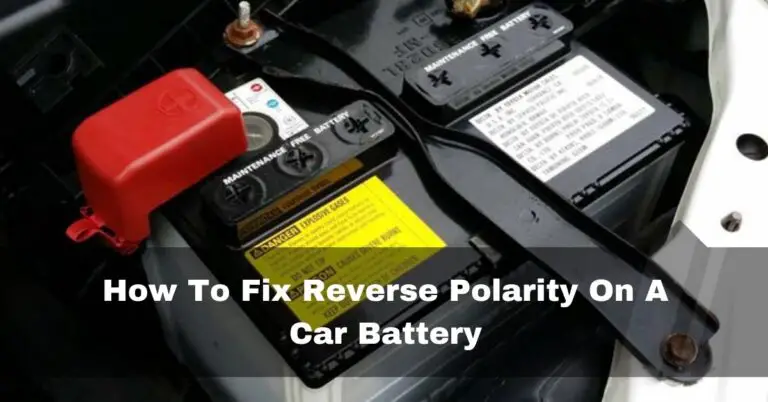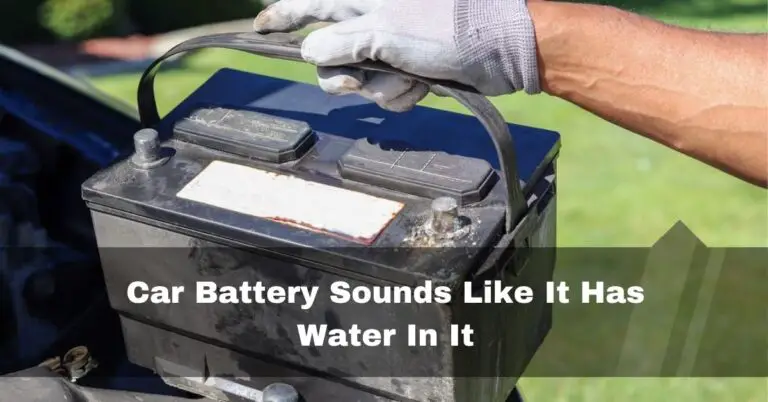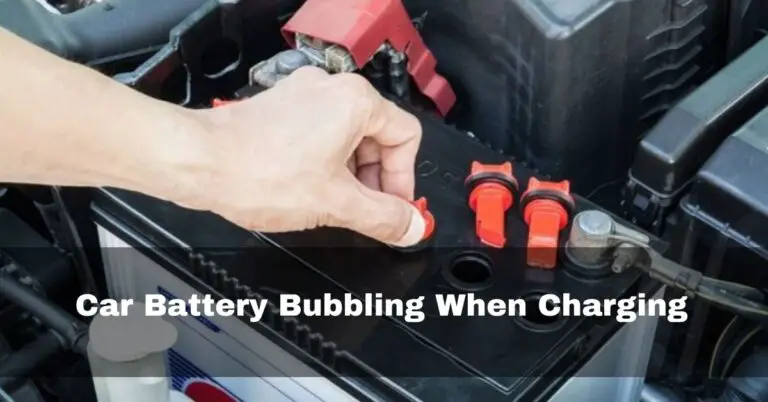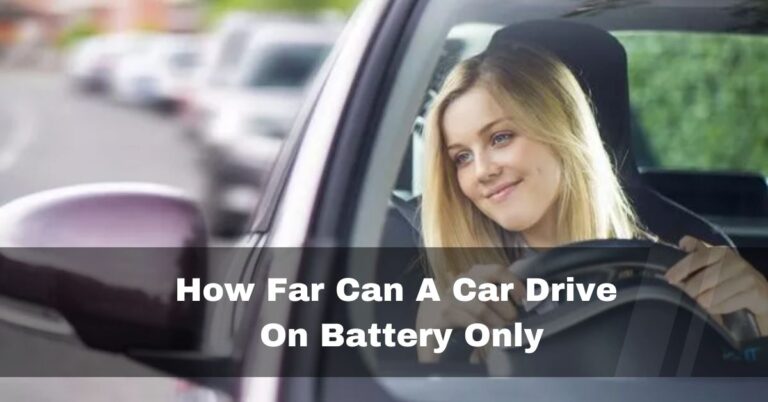Car Making Noise After Battery Change – Dont Ignore – 2024
In my own experience, after installing a new battery, I encountered peculiar sounds that raised concerns. It’s essential to address these noises promptly, as they can be indicative of underlying issues that might affect your vehicle’s performance or electrical system.
Car making noise after battery change (Short Answer)
A car making noise after a battery change may signal loose connections, damaged components, or relearning processes, Stripped Plastic Gear in Actuators, and Incorrectly Reinstalled Air Intake.
In this article, we’ll delve into some common reasons for these noises and offer practical solutions based on personal experience.
Table of Contents
Why Is The Car Making Noise After A Battery Change?
1. Reinitializing Systems:
Many current cars need to reset their systems and settings after changing the battery. This process can involve resetting the clock, changing the radio presets, and recalibrating the power windows.

You might hear clicking, whirring, or even a short electrical buzz during these resetting processes. Most of the time, these noises are common and should stop as the systems finish setting up.
2. Loose Wire Terminals:
If the wire connections on the battery are loose, the battery may click or buzz. When the terminals aren’t attached well, they can vibrate or spark, which makes these sounds.
3. Wiring Issues:
A problem with the electrical connections will likely cause a noise that doesn’t stop, especially if it comes from the wires between the starter and the battery. Strange sounds can be made by wires that are loose or broken.

4. Incorrectly Reinstalled Air Intake:
If you didn’t put the air intake back on after replacing the battery, it could block the airflow and make the engine noise louder. The air entry makes sure that the engine gets enough air to burn.
5. Stripped Plastic Gear in Actuators:
If you change the batteries and still hear a clicking sound, it could be because the actuator is broken. Actuators control the movement of different car parts, like the door locks or HVAC vents. This noise can come from a broken plastic gear inside an actuator.
6. Fuel Trim Relearning:
Modern cars adjust their fuel trims for the best speed and fuel economy. After changing the battery, the car may need time to relearn these fuel trims. As the engine control system adjusts, the car may make different sounds.
Also Read: How To Listen To Drive-In Movie Without Draining Car Battery
7. Faulty Idle Air Control System:
If your car makes strange noises when it’s not moving, it may have a problem with its idle air control (IAC) device. By controlling how much air goes into the engine, the IAC system controls how fast the engine runs at idle.

8. Electrical Short:
When components turn on, if you hear buzzing or other electrical noise, it could be a sign of a short circuit or a broken switch.
9. Starter Motor Engagement:
After you change the battery, you might hear a clicking sound when you turn the key or press the start button. This noise could be caused by a starting motor that turns on but doesn’t start the engine. This problem could happen if the new battery doesn’t have enough power or if there’s a problem with the starting motor.
Also Read: How Long Does It Take To Change A Car Battery
10. Belt Noise:
The serpentine belt, or accessory belt, is another part of a car that often makes noise after changing the battery. When the battery is changed, the stress on the belt may change, which could cause it to squeak or chirp. Most of the time, these noises happen when the engine starts or you speed up.

How To Fix Car Making Noise After A Battery Change?
Here, I share my personal insights into addressing these post-battery change sounds:
1. Drive Your Car:
Let your car run for a few driving rounds, usually within a day or two, so the electronic systems can figure out how to work again. As your car gets used to the change, the noises that come with it should go away independently. Most of the time, you don’t need to do anything; the problem goes away as the car’s systems settle down.
Also Read: Why Is My Car Battery Showing 15 Volts
2. Check Loose Wire Terminals:
Turn off the car. Use the right wrench to gently tighten the battery posts’ wire connections by turning them clockwise. Avoid over-tightening. Check for any remaining play. If secure, start the car to ensure no clicking or buzzing noises. Reconnect any removed accessories.

3. Replace Actuator:
Most of the time, you must replace the broken actuator to fix a stripped plastic gear. Usually, a car technician or mechanic is the best person to do this kind of repair. These experts will thoroughly diagnose what’s wrong and, if necessary, replace the broken actuator with one that works.
4. Inspect Wiring:
You can tighten loose links with the right tools if you find them. Ensure the battery terminals are tight on the battery posts and that all the other connections are tight. If you find broken wires, fixing them immediately is essential.

5. Inspect The Air intake System:
First, turn off the car and let it cool. Inspect the air entry parts for any loose or improperly attached components. Reconnect and secure all parts, including hoses, clamps, and screws.
Verify the cleanliness and correct placement of the air filter; replace if necessary. Remove any obstructions in the air entry.
Finally, test drive the car to ensure the noise issue is resolved, indicating the correct reassembly of the air intake components.
Also Read: Can You Drink Car Battery Water
6. Clean IAC Valve:
Clean the IAC valve with a soft brush and appropriate solutions to address carbon issues. Check and secure electrical connectors and wires. Reset the ECU by disconnecting the battery briefly. Clean the throttle body with a suitable cleaner. Inspect and repair any leaks in vacuum lines affecting the IAC system.
7. Check Electrical Short Curicuts:
- Inspect wires and connections for damage, exposed wires, or loose connections. Check the connected switch.
- Use a tester for continuity in case of suspected short circuits; fix any identified issues.
- Troubleshoot by swapping the switch with a similar one from a less critical system. If the problem persists, consider replacing the receiver.
Also Read: How Long Does It Take To Charge A Car Battery At 6 Amps
8. Battery Replacement:
- Use a tester to check the battery’s charge; a fully charged battery should read about 12.6 volts. If significantly lower, charge or replace the battery.
- Inspect battery connections for corrosion or looseness; clean and tighten them to ensure proper electrical flow.
- Examine battery cables for damage; repair any identified issues.
- If all else seems fine, give the starter motor a light tap while starting the car.
- Consider a jump start to test if a weak battery is causing the problem.

9. Inspect Belt Tension:
After replacing the battery in your car, if the serpentine or utility belt starts to squeak or chirp, you need to fix this problem as soon as possible.
When the battery is changed, the belt tightness often changes, which can cause the belt to wear out and possibly damage other parts of the engine if not fixed. To fix this, it’s best to call a skilled mechanic to check the belt’s tension and adjust it as needed.
Navigating Post-Battery Change Noises: A Personal Insight:
Having recently tackled the task of changing my car’s battery, I can appreciate the satisfaction of completing routine maintenance. However, it’s not uncommon to encounter unexpected noises post-battery change.
Clicking Sounds:
Possible Cause: Loose Battery Terminal Connections.
Solution: Ensure all battery terminals are securely tightened. A wrench or socket set can come in handy for this task. A loose connection can cause clicking sounds as electrical currents are interrupted.
Also Read: How Far Can A Car Drive On Battery Only
Humming or Whirring Noises:
Possible Cause: Alternator Issues.
Solution: Check the alternator belt for proper tension and signs of wear. A humming noise could indicate a misaligned or worn-out belt. Tightening or replacing the belt may resolve the issue.
Buzzing or Whining Sounds:
Possible Cause: Voltage Regulator Malfunction.
Solution: The voltage regulator ensures a stable flow of electricity. If you’re hearing buzzing or whining, it might indicate a regulator problem. Consult your vehicle’s manual or seek professional help to address this issue.
Repeated Clicking When Trying to Start:
Possible Cause: Weak Battery or Starter Issues.
Solution: If the clicking persists, it might indicate a weak battery or starter problems. Check the battery charge, and if needed, recharge or replace the battery. If the issue persists, the starter might need inspection.
Also Read: Car Stalling After Battery Change
Sizzling or Hissing Sounds:
Possible Cause: Acid Leaks.
Solution: Acid leaks can occur from the battery. If you hear sizzling or hissing, exercise extreme caution. Disconnect the battery immediately and consult a professional for proper cleanup and evaluation.
These solutions are drawn from my own experiences post-battery change. While changing a car battery is a routine task, understanding and addressing these noises promptly can ensure a smooth driving experience and prevent potential complications.
Related Questions:
1. Can A Bad Car Battery Cause Engine Noise?
You should replace the battery if your automobile is producing noise. When starting or stopping the vehicle, the engine is malfunctioning if there is a clicking sound. Strange noises like buzzing and whining beneath your hood might indicate a poor electrical system!
2. Does A New Battery Affect Car Performance?
The EMS system of the vehicle is reset when an old car battery is replaced with a new one. It returns to the factory settings that were initially installed in your car. Your car’s efficient operation is primarily the responsibility of the Engine Management System (EMS). It results in the excellent performance that your car already has.
3. Does A Dying Battery Make Noise?
When you try to start your car, there is a clicking sound. When you turn on your car, if you hear a quick, repetitive clicking, it could result from a failing alternator, a filthy or broken battery, or a dying car battery.
4. Why Does My Car Make A Weird Sound After The Battery Dies?
After changing the battery, if your car is still making a loud clicking noise, you may have an alternator problem or an ignition wire issue. A damaged diode in the alternator may be the source of the problem, resulting in an electrical spike when you try to start your car.
5. Why Is My Car Acting Weird After A New Battery?
Your car may act weird after a new battery due to disruption in electronic systems, leading to issues like loss of memory settings and triggering warning lights.
6. Can Changing A Car Battery Cause Problems?
Changing a car battery can cause problems such as starting issues, driveability issues, and loss of electronic functions, including air conditioning and power accessories.
7. Can A New Battery Make Your Car Louder?
The car battery does not impact the vehicle’s sound; its primary function is to start the engine.
8. Why Is My Car Vibrating After Battery Change?
Car vibrating after battery change? Vibrations after a battery change may occur as the car’s computer relearns systems like variable timing, and adjusting knock sensors during the process.
9. How Do I Reset My Car After A New Battery?
Resetting a car after a new battery involves disconnecting it for an ECU reset, similar to a computer hard reboot, commonly used for persistent check engine light issues.
10. What Problems Can Happen After Disconnecting Car Battery?
Problems after replacing car battery? Disconnecting a car battery may result in problems like rough idle, stalling, and transmission issues due to the reset of electronic systems.
Conclusion:
Having recently tackled the task of changing my car’s battery, I can attest that the process doesn’t always conclude without a few unexpected sounds cropping up. It’s crucial to grasp the potential reasons behind these noises and, more importantly, how to remedy them for seamless car operation. From my personal experience, these sounds often stem from issues like loose battery connections, hiccups in the starting motor, complications in the air intake system, or glitches in electrical components.
Related Articles
- Can A Bad Battery Make Your Car Overheat
- Car Starts After Disconnecting And Reconnecting Battery
- Lightweight Car Battery Daily Driver
- Car Inspection After New Battery
References:
- https://www.infinitiofcoolsprings.com/blogs/739/why-does-my-car-make-a-clicking-sound-when-i-try-to-start-it/
- https://www.crvownersclub.com/threads/grinding-noise-when-starting-after-i-replaced-battery.126193/
- https://www.justanswer.com/gm/5xlh4-changed-battery-battery-loud-clicking-noise-when-started.html
- https://www.reddit.com/r/MechanicAdvice/comments/a1d3yv/battery_replaced_and_now_my_car_shakes/
- https://www.quora.com/Why-does-a-car-shake-after-changing-the-battery

![Battery Light Comes On Under 2000 Rpm – [2024] What To Do](https://vehicleslounge.com/wp-content/uploads/2023/07/Battery-Light-Comes-On-Under-2000-Rpm-768x402.jpeg)
![Car Inspection After New Battery – [2024] Quick Inspection](https://vehicleslounge.com/wp-content/uploads/2023/10/Car-Inspection-After-New-Battery-768x402.jpg)




